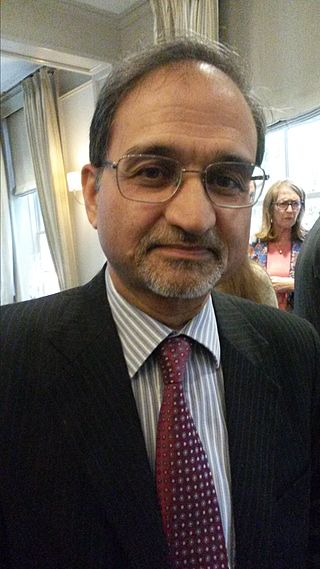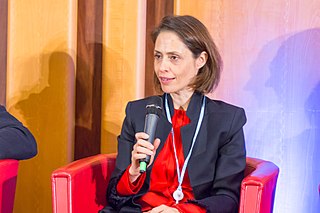Bioethics is both a field of study and professional practice, interested in ethical issues related to health, including those emerging from advances in biology, medicine, and technologies. It proposes the discussion about moral discernment in society and it is often related to medical policy and practice, but also to broader questions as environment, well-being and public health. Bioethics is concerned with the ethical questions that arise in the relationships among life sciences, biotechnology, medicine, politics, law, theology and philosophy. It includes the study of values relating to primary care, other branches of medicine, ethical education in science, animal, and environmental ethics, and public health.

The Council for International Organizations of Medical Sciences (CIOMS) is an international non-governmental organization of 40 international, national, and associate member groups representing the biomedical science community. It was jointly established by the World Health Organization (WHO) and United Nations Educational, Scientific and Cultural Organization (UNESCO) in 1949 as a successor to the International Medical Congress that organized 17 conferences from 1867 until the 1913 outbreak of World War I.

The Hastings Center is an independent, nonpartisan bioethics research institute and think tank based in Garrison, New York.

Donna L. Dickenson is an American philosopher who specializes in medical ethics. She is Emeritus Professor of Medical Ethics and Humanities at the University of London, fellow of the Ethox and HeLEX Centres at the University of Oxford, and visiting fellow at the Centre for Ethics in Medicine, University of Bristol.

Daniel Isaac Wikler is an American public health educator, philosopher, and medical ethicist. He is currently the Mary B. Saltonstall Professor of Population Ethics and Professor of Ethics and Population Health in the Department of Global Health and Population of the Harvard T.H. Chan School of Public Health in Boston. He is Director and a core faculty member in the Harvard Program in Ethics and Health (PEH). His current research interests are ethical issues in population and international health, including the allocation of health resources, health research involving human subjects, organ transplant ethics, and ethical dilemmas arising in public health practice, and he teaches several courses each year. He is a fellow of the Hastings Center, an independent bioethics research institution.
Jonathan D. Moreno is an American philosopher and historian who specializes in the intersection of bioethics, culture, science, and national security, and has published seminal works on the history, sociology and politics of biology and medicine. He is an elected member of the National Academy of Medicine.
Ruth Macklin is an American philosopher and retired professor of bioethics.

Richard Alan Cash is an American global health researcher, public health physician, and internist. He is a Senior Lecturer in International Health at the Harvard T.H. Chan School of Public Health in Boston.
Michael Alan Grodin is Professor of Health Law, Bioethics, and Human Rights at the Boston University School of Public Health, where he has received the distinguished Faculty Career Award for Research and Scholarship, and 20 teaching awards, including the "Norman A. Scotch Award for Excellence in Teaching." He is also Professor of Family Medicine and Psychiatry at the Boston University School of Medicine. In addition, Dr. Grodin is the Director of the Project on Medicine and the Holocaust at the Elie Wiesel Center for Judaic Studies, and a member of the faculty of the Division of Religious and Theological Studies. He has been on the faculty at Boston University for 35 years. He completed his B.S. degree at the Massachusetts Institute of Technology, his M.D. degree from the Albert Einstein College of Medicine, and his postdoctoral and fellowship training at UCLA and Harvard University.
Jamie Lindemann Nelson is a philosophy professor and bioethicist currently teaching at Michigan State University. Nelson earned her doctorate in philosophy at the State University of New York at Buffalo in 1980 and taught at the University of Tennessee at Knoxville and St. John's University before moving to Michigan State University. In addition, Nelson was an Associate for Ethical Studies at The Hastings Center from 1990–95 and is both a Woodrow Wilson Visiting Fellow and a Fellow of the Hastings Center. Nelson usually teaches courses on biomedical ethics, ethical theory, moral psychology, feminist theory, and philosophy of language.
Dr. Abdallah Daar is an emeritus Professor of Clinical Public Health, Global Health, and Surgery at the University of Toronto. He has also been a Senior Scientist at the Research Institutes of University Health Network/Toronto General Hospital Research Institute, and the Hospital for SickKids. At the University of Toronto Joint Centre for Bioethics, from 2001 to 2007, he was the co-director of the Canadian Program on Genomics and Global Health, and the Director of the University of Toronto Program in Applied Ethics and Biotechnology. At the Sandra Rotman Centre, he was Director of Ethics and Commercialization.
Kameshwar Prasad is an Indian neurologist, medical researcher, academic and the head of the Department of Neurology at the All India Institute of Medical Sciences, Delhi (AIIMS), known as a proponent of evidence-based medicine (EBM) and evidence-based healthcare (EBHC). The government of India awarded him the fourth highest civilian honour of the Padma Shri in 1991.

Ranjit Roy Chaudhury, was an Indian clinical pharmacologist, medical academic and health planner, who headed the National Committee for formulating the policy and guidelines on drugs and clinical trials in India. He was the chairman of the joint programme of World Health Organization and Government of India on Rational Use of Drugs in India. He was the founder president of the Delhi Medical Council and the president of the Delhi Society for Promotion of Rational Use of Drugs.

Henk Antonius Maria Johannes ten Have is Professor emeritus at the Center for Healthcare Ethics at Duquesne University in Pittsburgh, U.S.A. where he has been Director since 2010. Previously, he served in UNESCO as Director of the Division of Ethics of Science and Technology (2003–2010). His recent works are: Global Bioethics—An Introduction (2016), Vulnerability—Challenging Bioethics (2016), Encyclopedia of Global Bioethics (2016), and Wounded Planet (2019).

Shekhar Saxena, MD, FRCPsych, DAB, MRC, Psych, since 1998 has worked at the World Health Organization (WHO) and since 2010 has been the Director of the Department of Mental Health and Substance Abuse (MSD) at World Health Organization's Headquarters Office in Geneva, Switzerland. He is recipient of the 2017 Leon Eisenberg Award. In September 2018 joined the Harvard T.H. Chan School of Public Health as visiting professor of Global Mental Health in the Department of Global Health and Population.

Christine I. Mitchell is an American filmmaker and bioethicist and until her retirement in September 2022, the executive director of the Center for Bioethics at Harvard Medical School (HMS).
Eric M. Meslin PhD is a Canadian-American philosopher-bioethicist and current President and CEO of the Council of Canadian Academies (CCA).

Eftychia ("Effy") Vayena is a Greek and Swiss bioethicist. Since 2017 she has held the position of chair of bioethics at the Swiss Institute of Technology in Zurich, ETH Zurich. She is an elected member of the Swiss Academy of Medical Sciences.
Nancy Ann Silbergeld Jecker is a bioethicist, philosopher, and author. She is Professor of Bioethics and Humanities at the University of Washington School of Medicine, Department of Bioethics and Humanities, with Adjunct Professorships at the university's Department of Philosophy, School of Law, and Department of Global Health. She also holds visiting professorships at the University of Johannesburg, Gauteng South Africa and the Chinese University of Hong Kong Centre for Bioethics
Vasantha Muthuswamy was an Indian physician and bioethicist, head of the Indian Council of Medical Research's Division of Basic Medical Sciences, Traditional Medicine, and Bioethics, and the Division of Reproductive Health and Nutrition, from 1990 to 2008. She was a leader in establishing, revising, and promoting ethical guidelines for medical research in India. She participated in international organizations and projects focused on bioethics, and was a noted critic of ethics dumping.










